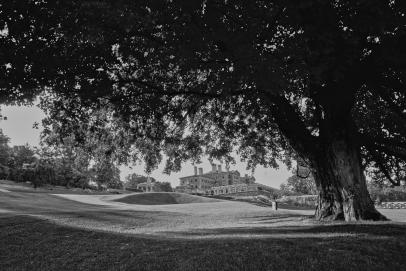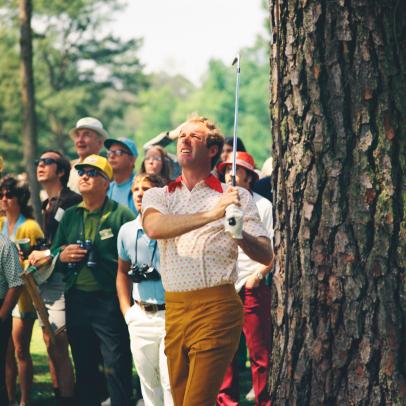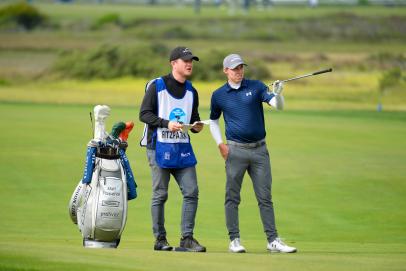An Unfathomable Win
A golfer's incredible triumph just days after his father's sudden death
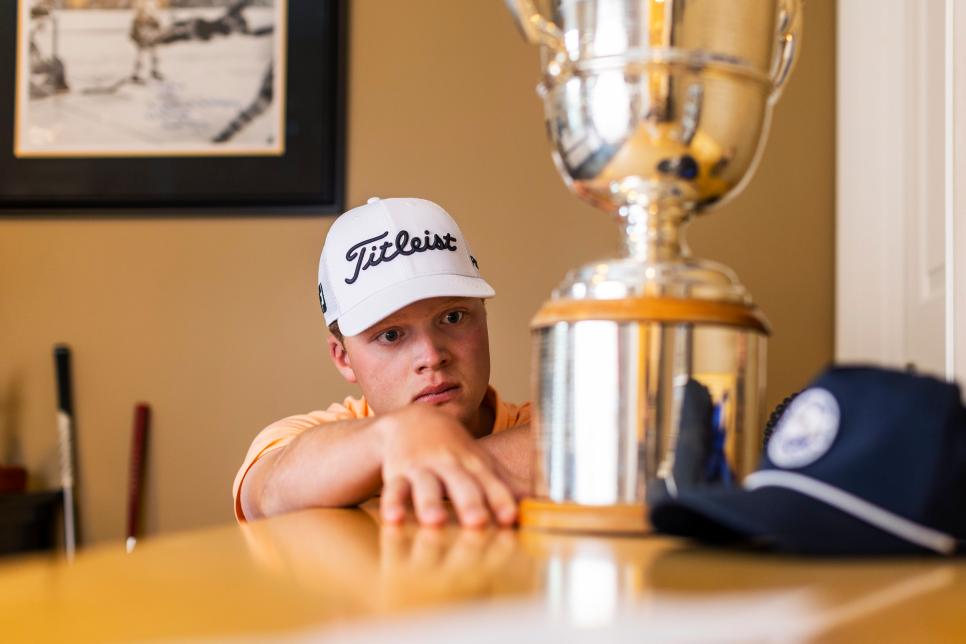
MONDAY
On July 11, Conner Willett, a 19-year-old with glasses and a golf tan, walked to the first tee at the Concord Country Club in suburban Boston to take his opening drive in the Massachusetts Amateur Championship. His uncle Bryan was his caddie. Unusually, the starter gave Conner a ball when he arrived. The initials “RW” had been written on it. Ethan Whitney, Conner’s 19-year-old friend, playing ahead of him in the tournament, had left it for him on the tee box. The ball had sat like a pearl on the grass until the starter worried that someone else might pick it up, so he held onto it until Conner arrived. Conner nodded his thanks and handed the ball to Bryan to keep safe in his bag.
The RW stood for Rick Willett, Conner’s 52-year-old father. On the previous Thursday, he had choked on his dinner and his heart had stopped; he was later declared brain dead at Beth Israel Deaconess Medical Center. Conner had said goodbye to his father at the hospital on Saturday afternoon.
When he teed up his ball less than 48 hours later, he presumed that his father had died sometime over the weekend. Beth, his mother, who had taken her customary place down the fairway—she forecaddies for her son because she can’t bear to watch him putt—was one of the few people who knew that Rick was still on life support. Rick was an organ donor, and the transplant surgeries were scheduled to begin the following day, Tuesday, at 2 p.m., during Conner’s second round. Beth didn’t think Conner needed to know that.
It was warm and sunny at Concord, a 6,679-yard par-70 designed by Donald Ross. It’s heavily treed with challenging greens, and its opening holes present one of the stiffest starting stretches in Massachusetts. Conner fought to keep his usual routine, which is quick. Otherwise he can talk to himself too much, often negatively. His challenges on the course were almost always mental; physically, he’s ridiculously talented. Shawn Hester, his swing instructor, says that Conner’s swing might be the best he has seen. “A God-given gift,” Hester says. “He was born to play golf.” Charlie Doar, his former high school coach, thought Conner’s hopes for his game sometimes made him blind to how good it already was. “He always wanted it so much,” Doar says. Now Conner’s usual maelstrom of swing thoughts were blocked out by far larger concerns. Bryan looks so much like Rick, there had been devastating double-takes from people who had heard the news and wondered whether they had misheard. They had not.
Bryan had been there the night of the accident at a member-guest dinner in the pavilion at Charles River Country Club, the Willett’s home course. Rick forked a piece of prime rib into his mouth and made a face. “Dude, are you OK?” Bryan asked him. Rick didn’t respond. He sat in his chair at the table, silently choking to death. Bryan realized what was happening, and he used the Heimlich maneuver to try to save his brother, but it didn’t work. He yelled for someone to call 911. Three doctors in attendance rushed to help Rick, but they couldn’t clear his airway either. They performed CPR until paramedics arrived.
Bryan called Beth as the ambulance was pulling away from the course. It was 8:20 p.m. She and Conner were driving back from Syracuse, where he had finished third in that day’s 36-hole U.S. Amateur qualifier, missing out by a single place. It might have been the best golf Beth had seen Conner play. “It was awesome,” Beth says, “really fun to watch.” Conner’s own joy was muted because his father hadn’t called after the round like he normally did. “I never got that call,” Conner says.
Instead, Bryan kept phoning Beth with updates, veiled enough to be alarming. She dropped Conner at home before she went to Beth Israel a little past midnight. Her brother Rich had joined Bryan at the hospital, and they met her outside the ER.
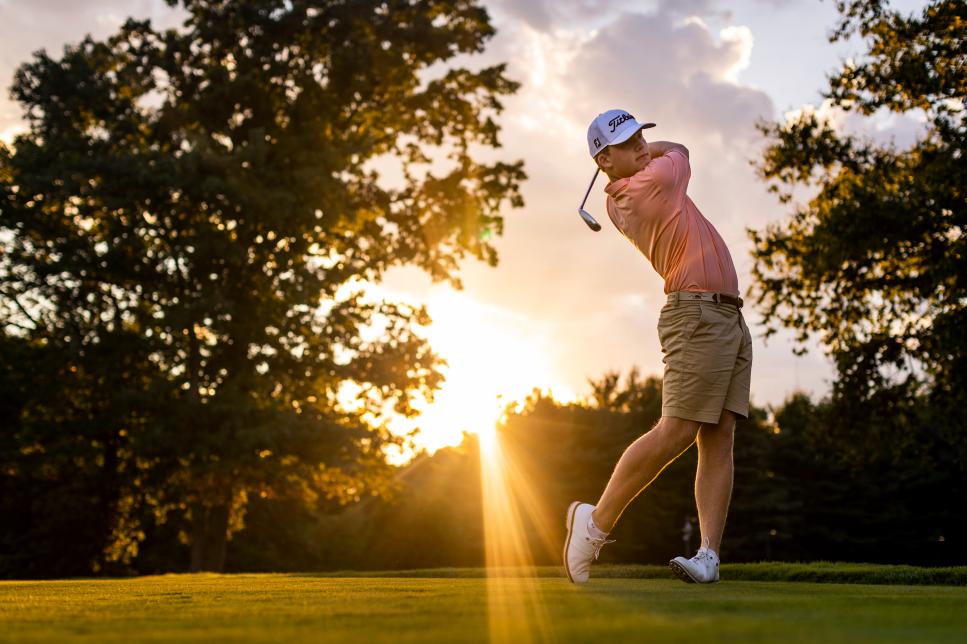
Photographs by Adam Glanzman
“I knew from my brother’s face,” Beth says. After spending some time with Rick, she went home. The hospital called her at 4:15 a.m., saying that Rick’s blood pressure was dropping, and if she wanted anyone to see him before he died, now was the time. Beth woke up Conner and Kaitlyn, his younger sister. “I don’t think I can go,” Conner said. “Yes, you can,” Beth said. Rick’s body hung on through the rest of Friday. His brain stayed silent. On Saturday, Beth, Conner and Kaitlyn filled his hospital room with some of his favorite things: his ski helmet, a golf club, a bottle of IPA, a can of Diet Coke. The hospital did more tests. The results were not good. The family said goodbye. On Sunday, Conner ripped through a round of drunk golf with his uncles to get out of the house. On Monday, he couldn’t even look at his breakfast before he went to the Mass Am.
First held in 1903, the tournament consists of two rounds of stroke play; the top 32 finishers then face off over three days of match play until a champion is crowned. It is a lot of golf, and it takes mettle to win. (Michael Thorbjornsen, who finished fourth at the PGA Tour’s Travelers Championship in June as an amateur and currently sits sixth in the World Amateur Golf Rankings, raised the ancient cup in 2021.) Conner was already exhausted and probably in something like shock. He took a practice swing and then another. I could shoot 90 right now, he told himself, and nobody would say or think anything. His first drive was long and true, and for the rest of the round, his swing felt as free as it had in years. Every club in his bag felt like an extension of himself. He picked a target, he picked a number, and he hit it, and then he walked to his ball and did it again. He shot 69.
TUESDAY
The Willett family is an extended one, including countless friends made on golf courses. Their big white house in Wellesley—together with the house next door, home to Wyatt Barlage, Conner’s best friend—had become a makeshift commune, where emotional labor was shared. Beth’s sister, Missy, and two of her friends had taken on the funeral arrangements. Over the course of the week, they narrowed down Beth’s choices, or offered ideas for songs and hymns, and left final decisions to her. Before Conner’s second round, they told Beth that Rick’s wake had been scheduled for Friday. Standard visiting hours were 4 p.m. to 7 p.m. Conner had played so well on Monday, Beth wondered: What if? “I didn’t want any reason to root against him,” she says. She asked for an hour’s grace, and the funeral home agreed to open its doors at 5 p.m.
Rick and Beth had met in college as engineering students and members of the ski team, and they were friends for a long time before they fell in love and married in 1999. They had Conner and Kaitlyn. Rick had started his career with General Electric but moved into private equity, and Beth stayed home with the kids. In 2005, when Conner was a toddler and Kaitlyn was three weeks old, the family went skiing in Vermont. One of Rick’s skis somehow released, and he went careening into the trees. He broke 14 bones, damaging himself so completely that he managed to shatter his cochlea, tucked away in his inner ear. A friend had to push a stick into his mouth to keep him from swallowing his tongue until help arrived. There was blood all over the snow.
“I really fucked myself up,” he said to Beth at the bottom of the mountain. Two days later, he was put into a coma. It was a month before he got out of the hospital, and even then, he struggled with basic tasks. His balance was off, and he couldn’t speak or swallow properly. Before the accident, golf had been his summer companion to skiing, diametric-seeming expressions of our capacity to conquer fear with practice and technique, the way Buzz Aldrin talked about bravery being the product of discipline. That spring, Rick used golf to put himself back together, and he brought along Conner, who learned the game while his father re-learned it. Watching them play was like watching two different versions of the same person, at two different times in their lives.
On Tuesday afternoon, Conner began his second round on the back nine. At precisely 2 p.m., Beth, again in her role as forecaddie, stole away from the gallery, which was steadily growing, a movable, makeshift wake before Friday’s actual wake. She was among the birches on the 11th hole when she said her last goodbye to her husband, while, perhaps a half-hour drive away, surgeons removed his organs. When Beth had seen Rick in those terrible hours of Friday morning, her experience with him at his bedside in Vermont 17 years before had informed her. There were signs of life in him back then, and after he’d recovered, Rick was like a human electrical storm—hugely competitive, voracious in his appetites, driven to make memories out of what he and Beth called their “bonus time.” At the hospital in Boston, Beth couldn’t feel a trace of Rick’s former spirit. She was standing alone in an empty room.
Beth returned her attention to Conner. He wasn’t playing quite as well as he had on Monday, but he was playing well enough. By the end of the day Tuesday, he finished with a 75, good for a tie for eighth and easy admission into match play, and his father’s liver and kidneys had been transplanted into their anonymous recipients, their chests rising and falling in their hospital beds.
WEDNESDAY

INSEPARABLE Conner with his dad, Rick, at age 2 and 13
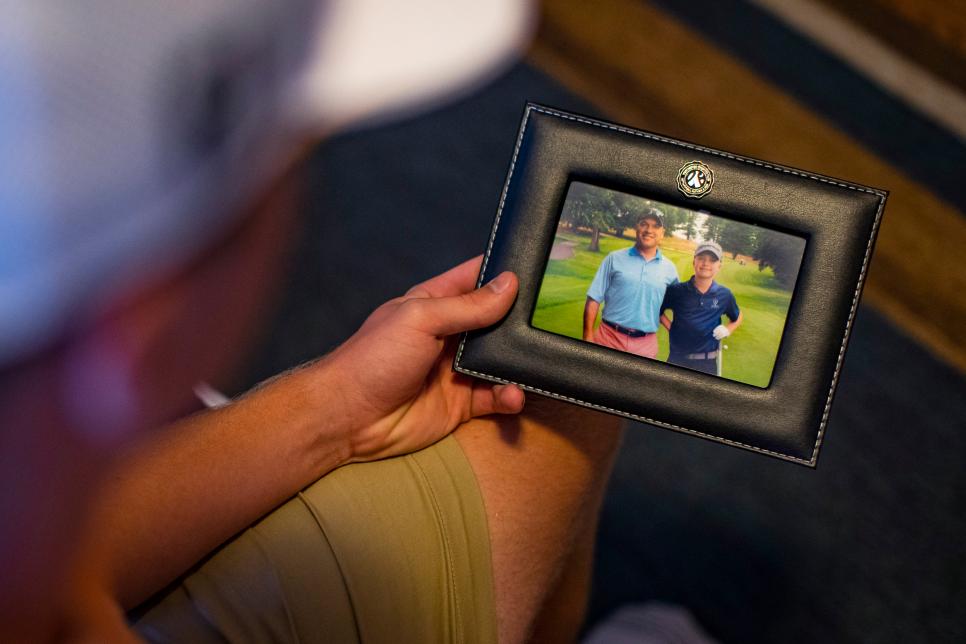
Conner’s first opponent was Nick McLaughlin, a tall, lanky minor legend in New England golf after he’d had a transcendent summer in 2015 that included a Mass Am win. Normally, Conner would have feared McLaughlin, but on that day he didn’t. His state of mind—his tragic new sense of perspective, along with some burgeoning feelings of predetermination—fit match play. He had never had a driving week like he was having. “Once I get on the tee, and just pump one straight down the middle, 40 yards past anyone else, then I put pressure on them,” he says. Better yet, he’d almost always hit second into the green, which reduced the strategic calculus his weary mind had to perform. “I’m letting them make my decisions.”
Conner leaned on McLaughlin by playing simple, steady golf, refusing to waver even as their match was pushed into a playoff. On the 20th hole, McLaughlin finally cracked. He doubled. Conner made par and was on his way to that afternoon’s round of 16.
His uncle Bryan was physically and emotionally spent. Weston Jones, a principal member of Conner’s teenage golf pack—they were a constant presence that week, on-course and off—came out of the gallery and picked up the bag. “I’ve played with him a million times,” Weston says. “We totally get it with each other.” When Conner drew Ethan Whitney, who had left the “RW” ball for him on Monday morning, half of the previous night’s basement poker game stood on the first tee.
WATCHING RICK AND CONNER PLAY WAS LIKE WATCHING TWO DIFFERENT VERSIONS OF THE SAME PERSON.
Conner and Ethan met when they were 12, and Conner was one of the dominant child golfers in New England, the boy who every other kid golfer wanted to be. In 2014, he qualified for the Drive, Chip, and Putt finals at Augusta National. The next year, he returned and tied for first. In 2016, he won four times on the state’s vaunted Challenge Cup circuit. He qualified for his first Mass Am when he was 14, started breaking 70 when he was 15, and at 16 he finished under par in more than half of his competitive rounds.
He was 17 when the game stopped loving him back. He developed chipping yips and routinely made doubles from decent greenside positions. “There were times when he could not hit the ball,” Beth says. His confidence in the rest of his game crumbled, made worse as he watched his golf buddies catch and overtake him. Ethan headed to Temple. Weston, the 2021 Mass Golf junior player of the year, went to Rutgers. Conner ended up at Georgetown, a top school but not exactly a golf power, and his freshman season had been a disappointment. The most memorable event was when the team’s van caught fire after an October tournament on Long Island—Conner, playing as an individual, had failed to break 80 in any of his three rounds—and everyone watched their clubs melt. (Rick flew down to D.C. and bought them new gear.)
Given everything that Conner had suffered, Ethan had given serious thought to forfeiting their match. That didn’t feel right, but he remained uncertain about his approach until he met Conner and Weston on the first tee. “If you take it easy on me, I will never speak to you again,” Conner told him. They agreed the loser would caddie for the winner the rest of the week. “I just didn’t want to go home,” Conner says. Now, one way or another, he would be back on the course the next day.
Conner opened birdie-birdie-birdie and soon took a 3-up lead, but both of them were almost cosmically dialed in. “It felt really free,” Conner says. “We were just lights out.”
“The most fun I’ve had in a match,” Ethan says.
They were followed by Stephen Hanjack, a 37-year-old father of two young boys who works in communications for Mass Golf. Hanjack had been wrestling with how to present Conner’s story, in part because his own father had died two years ago and the wounds felt suddenly fresh. Hanjack worried his coverage might seem intrusive if it went beyond golf. He was also drawn to Conner as though he were a proxy for his own fight against grief. “I didn’t want to make it about me,” Hanjack says. “But I almost felt like I was living through him. I don’t know how else to explain it.”
On the par-3 ninth, Ethan nearly made a hole-in-one, his ball resting inches from the cup. Conner was 40 feet short. Ethan had clawed back an earlier hole, and after Conner conceded the tap-in birdie, Ethan thought they would make the turn separated by only one. That was before Conner walked in his putt. Ethan, doomed to lose, 3 and 2, watched it fall and laughed. “I said to myself, ‘There is no way this kid loses this tournament.’ ”
Hanjack also felt a surge of belief. After that long putt on nine, he had tried and failed to push down the hairs on his arms, losing the war against his goose bumps.
THURSDAY

Conner and Ethan drove to the course together, where Conner was matched against Christian Emmerich from Holy Cross. Almost immediately, Ethan saw something worrying in Conner’s swing. He’d been automatic. Now he was steering his shots off-line. “He was getting a little stuck, trying to force it,” Ethan says. Conner lost three of the first four holes before Ethan reminded him to let the club do the work. Conner struck a great drive on No. 5 and slipped right back into the pocket. He halved the hole and won the next to steal back the tee on seven. “I knew that was it,” he says. He beat Emmerich, 2 up.
After the match, Conner and Ethan sat down to lunch. Once again, Conner didn’t eat. “My nerves were shot,” he says. He knew, with a strange dread, that he wasn’t going to shoot worse than 68 in the afternoon semifinal, as though he didn’t have it in him to play bad golf, his game no longer his own. “I was honestly hoping someone shot 65 against me,” he says, “so I could go home and sleep and breathe and get ready for that weekend.” He was matched against Billy Argus, who’d led Saint Anselm College to the NCAA Division II title at the New England Intercollegiate Golf Championship in 2018. Conner thought if Argus beat him, it would almost be an act of mercy.
Walking up No. 4, Conner stopped in the middle of the fairway and put his hands on his knees. “Dude, I can’t do this,” he said to Ethan. “I’m so tired. I’m so depressed.”
Only weeks before in June, Conner had caddied for Ethan at the Massachusetts Open, where Ethan had held the overnight lead heading into the final round before finishing fourth. A few days later, Conner was set to play a New England Amateur qualifier. Ethan was scheduled to tee off at another event. Before they got into their separate cars to drive home, Ethan threw a dart: “You’re probably just going to shoot 80; you should come caddie for me.” It was a joke, a razz between brotherly rivals, and both boys laughed. Then Conner sat in his car, breathing through what he described as “a minor panic attack.”
By the time he made it back to Wellesley, he decided that he didn’t want to play tournament golf anymore. Two years of disappointment had taken their toll, so much so that Rick’s attempts at inspiration—“You’re such a good golfer, you should be shooting 67 every round”—had lately sounded like criticism. “He meant it as encouragement,” Conner says. “He didn’t realize it was a burden.” In Conner’s mind, golf wasn’t fun anymore. It was an exercise in how much pressure he could withstand, and he had reached his limit.
He and Rick ended up in the backyard, father and son and a couple of beers, airing it out. Rick listened, and then he told Conner that he, too, had battled early in his life. He wasn’t naturally good at anything, or not nearly as good as he wanted to be. Even reading had been hard for Rick. Everything he had accomplished—his education, his business success, his recovery from his skiing accident—he owed to lies he had told himself. “He would just convince himself he was the best at everything,” Conner says. Rick told his son that whatever he believed about himself would become true about himself, and if that required a little self-delusion, so be it.
Conner hit the range the next day. “I went with a different attitude—basically, I am the shit,” he says. He laced the ball. He decided to play the New England Am qualifier after all and hit 17 out of 18 greens. “That was the beginning,” he says. Playing Charles River, he flirted with the course record, and he did his next round there, too. On June 22 at Hyannis, he qualified for the Mass Am by overcoming a rocky start to tie for second, and then he finished third at Syracuse.
Now his dad was gone, and he was bent over on the fourth fairway in the semifinal of the Mass Am. What golf demands of you, grief sometimes does, too. Both are long journeys, full of thoughts. Both are lonely experiences that are also shared. Ethan stood up his wounded friend: “Who’s the grittiest here?” he asked. The same instinct that had made Conner play the tournament in the first place—“There’s no way my dad would let me not play,” he says— now made him decide that his fastest way off the course and into bed was to crush Argus. “He’s a phenomenal dude,” Conner says. “But I wanted to destroy him.”
Followed by his ever-expanding gallery, Conner played like a man who couldn’t miss. On No. 13, he faced a massive, swinging putt from off the green. He played at least 20 feet of break, so much that in Hanjack’s video of the putt, the ball exited the camera’s frame before re-entering it. The putt dropped. Between his drive on No. 5 in his morning match and his walk to No. 14 in the afternoon, Conner had gone 27 consecutive holes without a bogey.
He was good for one more, and he beat Argus, 5 and 4.
FRIDAY
The morning of the final—two rounds of 18 against Ryan Downes, a 16-year-old phenom, the first time in 114 editions of the Mass Am that two teenagers played for the trophy—Conner couldn’t eat again. He lost eight pounds over the week. While Ethan demolished a plate of French toast at Beth’s kitchen counter, Conner retreated to the living room couch, trying to keep his stomach from turning inside out. Ethan took a break from his feast to spell out the day’s mantra for the first of many times: We’re going to breathe in, and we’re going to breathe out.
On their last drive to Concord, Ethan asked Conner what it was like to know that every break was going to go his way and he was going to win. “Feels pretty good,” Conner said. Their reverie was broken when they arrived, and Conner’s phone buzzed: His huge putt from the previous day had made SportsCenter’s Top 10 on ESPN. Ethan was in the clubhouse toilet, unable to understand what Conner was hollering about on the other side of the door. Conner passed his phone under the stall before he bolted to another, dry heaving. He had nothing in his stomach to throw up.
ETHAN ASKED CONNER WHAT IT WAS LIKE TO KNOW THAT EVERY BREAK WAS GOING TO GO HIS WAY AND HE WAS GOING TO WIN.
The match started. Beth went ahead, as always, to the elevated second tee. She could see what seemed like the entire course, and she realized that her son and Ryan Downes were the only two golfers on it. Every hole except for the one they were playing was empty, and she took in the silence. The way circumstance dictates whether a blanket is a comfort or a weight, quiet wasn’t always a good thing for her that week, but in that moment, quiet was what she needed. “It was the perfect place to be,” she says.
Conner fell behind early, but true to Ethan’s prophecy, the breaks were going his way. On the 11th hole, Conner hit a snap-hook left off the tee, and the ball veered into the trees. There was a crack of timber, and the ball bounced out, finding the middle of the fairway. On No. 13, he put it into the fescue but had a good lie.
He was still three holes down. Conner looked into himself. “I didn’t know if I’d ever be in the championship match again,” he says. “I was like, If I don’t do this now . . . ” On the 15th tee, Ethan said, “Let’s go win the next four.” Conner did, including a birdie on No. 18, to take the lead before lunch.
After one more untouched meal, Conner and Downes began another round of close, nervy golf, but even after Conner dropped the first two holes, the match seemed only nominally like a contest. There were maybe 200 people walking with them by then—non-golfing friends had arrived from their construction jobs in ripped T-shirts and work boots—and most felt as though they were watching a story unfold for which they already knew the ending. Conner won the fourth hole to tie Downes and was never behind again. “Really successful people have fewer thoughts than people who aren’t as successful,” Shawn Hester says. “The tragedy of what happened with his dad enabled him to get to fewer thoughts.” By the turn, Conner wasn’t thinking anything much beyond, I might actually do this. On No. 11, Ethan dropped a few steps behind him, trying to hide the tears that were already starting to surface.
He hit a perfect drive. “Position A,” he says. His equally crisp approach landed 10 feet from the cup. He stood on the green and lined up his putt. In Stephen Hanjack’s video of those final moments, you can hear someone crying. That’s Stephen Hanjack. “I just wanted it to happen more than anything,” he says.
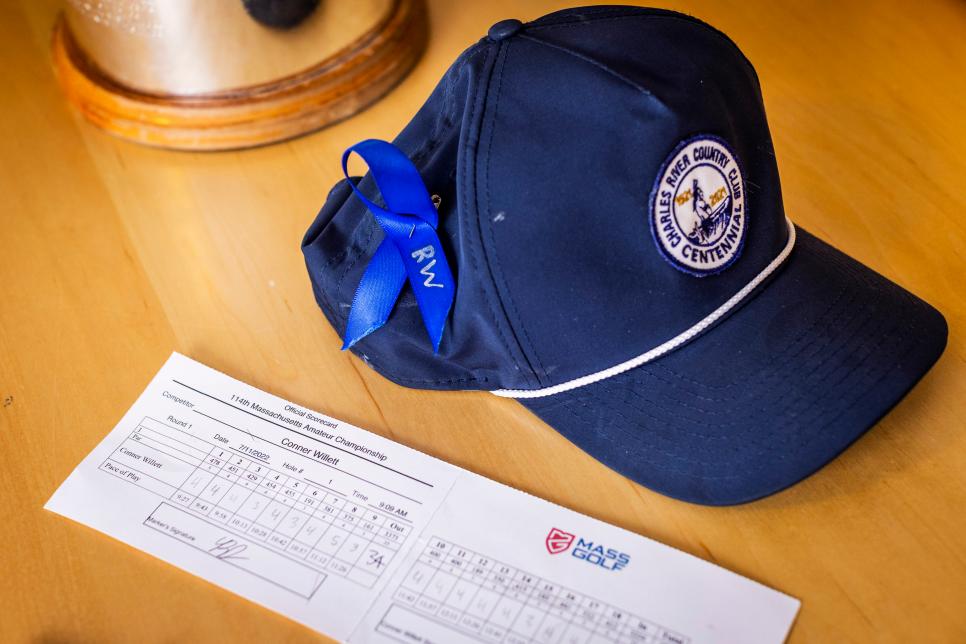
ATTESTED Conner’s hat and scorecard from his 36-hole final.
When the putt dropped—magically, inevitably—Conner, the youngest Mass Am winner in 25 years, pumped his fist and hugged Ethan, and then Beth and Kaitlyn. For once, Beth was greenside, but she had turned her back rather than watch. She knew the ball had gone in from the sound of the cheers. It was an instant of profoundly mixed emotion, as though all of life’s feelings had been tied into a knot in the middle of that green. Everyone was ecstatic for Conner. They were also raw with grief and regret. “If Rick had seen him win that tournament, it would have made his life,” Weston Jones says.
“I’m not an emotional person, but I cried when he made that putt,” Charlie Doar says. “I didn’t know how Beth was standing.” She was standing, she says, because she didn’t have any other choice. Motherhood had made her decisions for her.
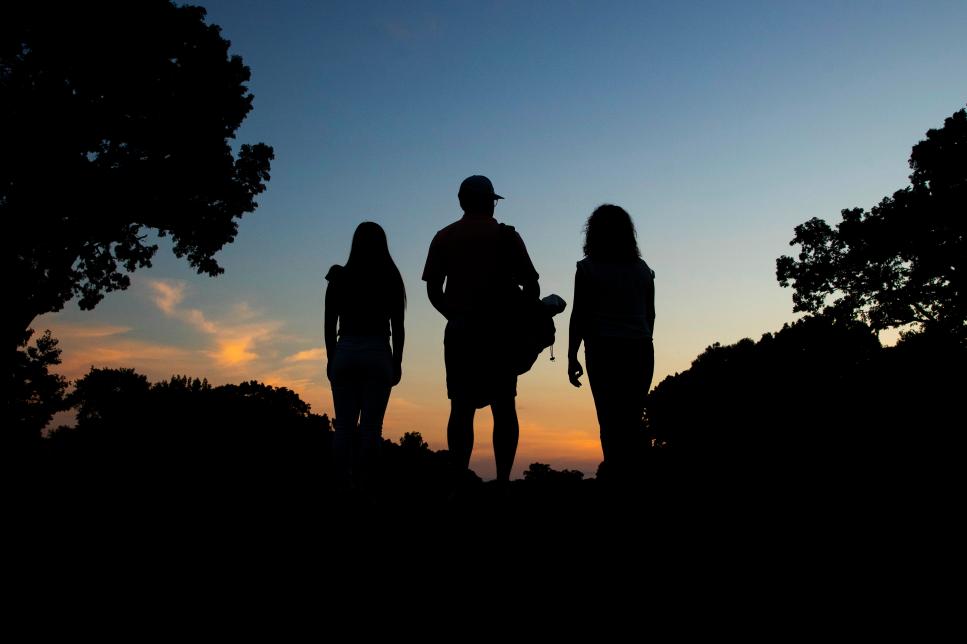
IN THE STILLNESS Conner, his sister, Kaitlyn, and his mother, Beth, reflect on a week of extreme emotions.
Hanjack took a golf cart over to the empty driving range and cried for 15 minutes, unable to stop the tears. “It just hit me,” he says. “I never cried like that when my dad died. I guess it took till then.”
Conner wasn’t there yet. “That was the best day of my life,” he says. “That was by far the happiest I’ve ever been. And then I came back home, and everyone was getting dressed up for the wake.” He didn’t change for his father’s service. He kept on his golf shirt, soaked through with sweat and other people’s tears. Conner, Beth, and Kaitlyn arrived together at the funeral home, old and traditional. Outside, the sun was high. Inside, there was a lot of red carpet and dark wood. A casket waited at the front of the room. A few minutes before 5 p.m., Conner Willett, the 2022 Massachusetts Amateur champion, stood next to it, found a little room among the flowers, and set down his trophy.
